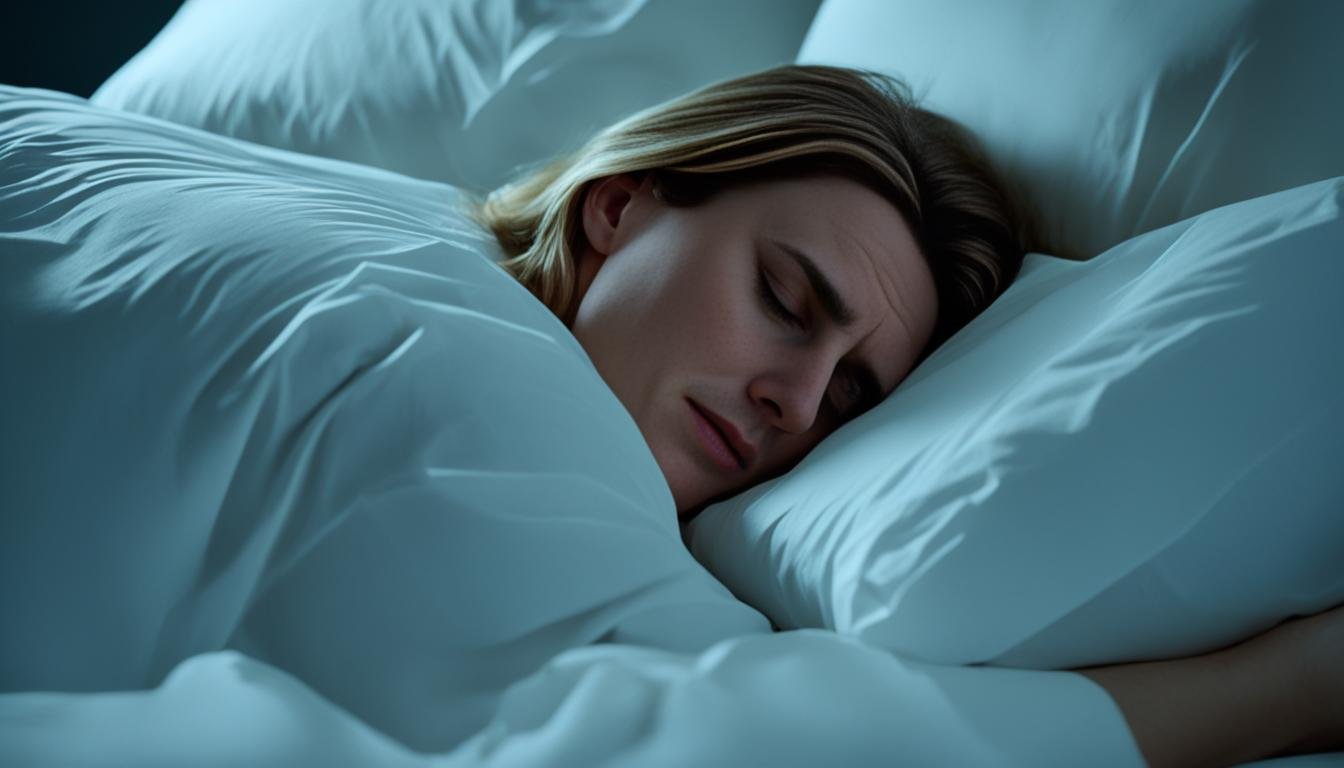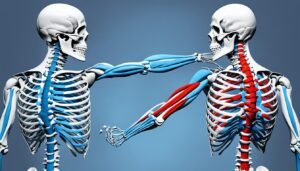Do you wake up with pain in your back or a stiff back after sleeping? Maybe you feel a backache upon waking. It’s not a good way to start your day. Sometimes, this morning back pain slows you down. It makes it hard to get moving early.
This issue might be common, yet it could be hinting at something more serious. The causes include sleeping the wrong way or a bad mattress. Sometimes, it’s from conditions like degenerative disc disease. So, figuring out the reason for your pain is crucial. It helps find the right solution.
Remember, back pain can be short-term (acute) or long-term (chronic). Most lower back pain goes away in a few days with care. But, if it stays or gets worse, seeing a doctor is a must. They can check for any big problems.
Key Takeaways
- Morning back pain might come from bad sleeping positions, poor mattress support, or serious health conditions.
- Back pain can last a short time (acute) or a long time (chronic).
- Care at home usually helps acute back pain improve within a few days. But if it keeps or gets worse, see a doctor.
- Figuring out what’s causing your morning back pain is the first step to making it better and preventing it from happening again.
- If your back pain is keeping you from moving around or doing your daily stuff, seeing a doctor is really important.
Understanding Morning Back Pain
Do you get back pain when you wake up? There could be many reasons for this. For example, you might have degenerative disc disease.
This issue makes your lumbar spinal canal narrow. It squeezes the nerves in your spine. This causes pain and stiffness, which can make moving hard. You might feel these problems more in the morning.
Causes and Contributing Factors
Fibromyalgia, a chronic disorder, can also be a reason. It makes many parts of your body hurt. If you feel aches and stiffness in the morning, this could be why.
If you exercised a lot the day before, you might feel pain too. Also, getting out of bed in the wrong way can cause morning back pain. Bad sleeping positions and a mattress that doesn’t really support you add to this.
Prevalence and Impact
Morning back pain can really affect your day. It’s a very common problem that affects many people.
Figuring out what’s causing your pain is the first step in feeling better. It can help you avoid it happening again.
Sleeping Posture and Mattress Quality
How you sleep and the mattress you use affect back pain you feel in the morning. Bad sleeping positions might hurt your lower back, hips, and neck. Also, if your mattress doesn’t support you well, it can cause pain and stiffness when you wake up.
Proper Sleep Positions
To lessen morning back pain, right sleep positions are key. If you sleep on your back, put a pillow under your knees. This keeps your spine aligned and your lower back more comfortable. Side sleepers should lay a pillow between their knees. This helps the hips and spine stay in line. For those who sleep on their stomach, a pillow under their stomach can help their lower back.
Choosing the Right Mattress
If your mattress doesn’t support your body well, you may wake up with back pain. It’s good to get a new mattress every 10 years. Look for signs your mattress needs replacing, like it’s sagging. A comfortable and supportive mattress is vital. Some brands let you try the mattress for a while. You can return it if it doesn’t help with your back pain or if it’s uncomfortable.
Degenerative Disc Disease
As people grow older, the vertebrae and discs in their back wear down. This can cause the lumbar spinal canal to get smaller. It’s called spinal arthritis or degenerative disc disease (DDD). DDD can press on spinal nerves. This leads to pain, stiffness, and less moving ability. It often affects the lower back or neck area.
Symptoms and Diagnosis
The pain from DDD can be mild or severe. It might spread to other body parts. The pain can be worse in the morning. It might make it hard to sleep. Other signs of DDD are muscle weakness in the legs or foot drop. You might feel numb or have a tingling sensation in your arms or legs. Pain may increase when you sit, lift things, or bend. But it could get better when you walk, move, or change how you are sitting or standing.
Treatment Options
For DDD, you can try over-the-counter pain drugs and physical therapy first. In worse cases, doctors might suggest surgery. This can be disc replacement or spinal fusion. It’s key to tackle the early back pain, stiff back after sleeping, and nocturnal back discomfort. This could help reduce your ache and start your day better.
Fibromyalgia and pain in back when waking up
Understanding Fibromyalgia
Morning back pain is a key sign of fibromyalgia. It’s a long-term issue that leads to aches and tenderness in various body spots. Besides, you might feel weak in your legs or have tingling in your arms and legs. Also, this pain could get worse when you sit, lift, or bend. Yet, it might feel better when you walk or change positions.
Managing Morning Back Pain
Fibromyalgia treatment changes based on the symptoms. It often includes pain relievers, as well as meds to reduce swelling. Lifestyle tweaks like regular exercise and making work setups better can help too. Also, some find relief in extra treatments like massage or acupuncture. To ease morning back pain, stretching in bed and a warm shower after waking up can be useful. Plus, keeping your room warm and cozy helps a lot.
Exercise and Overexertion
Exercising regularly can make your back stronger and reduce back pain. But, doing too much at the gym or in sports might cause morning back pain. It’s key to watch how you sit and stand after tough workouts. Also, warming up and cooling down properly helps your back.
If you feel back pain after working out, here’s what you can do:
- Use heat or cold packs on the sore area
- Take pain relievers like ibuprofen or naproxen
Watching your form and resting well are important. This helps you avoid waking up with back ache or post-sleep back pain after exercise.
Getting Out of Bed Properly
How you get out of bed is key to avoid early morning aches and pains. If you jump or lean too much when getting out, your back gets stressed. To lower the chance of morning back pain and stiffness:
- Get out of bed slowly.
- Use your arms to help you sit up.
- Let your legs hang off the bed for a moment. This helps your body get ready.
- Then, stand up gently.
Taking it slow and moving right lowers back stress. This helps you feel better and avoid pain.
Pregnancy and Back Pain
During pregnancy, lower back pain is very common. This can happen in the morning. In some places like the United States, 30-78% of pregnant women have back pain.
Causes and Risk Factors
Many things can cause lower back pain when you’re pregnant. This includes more hormones and the weight of the baby. Also, as your baby grows, your body changes. This can put more stress on your back. Hormones can make the joints in your pelvis looser, adding to the pain.
Relief Strategies
Back pain often gets better after the baby is born. But, if it doesn’t, there are things that can help. You can try OTC pain relievers, like Tylenol, or muscle relaxants. Hot and cold packs, gentle stretching, and sleeping on your side can also reduce the pain. Some people find acupuncture or chiropractic care helpful. And, regular exercise and stretches make your back stronger, which can help with pain.
If your back still hurts after two weeks, you should see a doctor. They might suggest things like acetaminophen. In some cases, back pain could show early labor or a problem like a UTI. If you also feel cramps, have a fever, or notice bleeding, make sure to tell your doctor.
Spinal Stenosis and Other Conditions
Having inflammatory arthritis in your spine can make your back hurt in the morning. It causes stiffness too. The same goes for spinal stenosis. This condition squeezes the nerves in your spine. The good news is, treatments like moving more and taking medicine work well. They help with the stiffness and aching.
Narrowing of the spinal canal causes spinal stenosis. It pressures the nerves, especially at night. This leads to waking up feeling sore and stiff in your back. People over 50 often feel this. They might have pain in back when waking up or feel backache upon waking. If your back hurts more after sleep, you should see a doctor.
Osteoarthritis is a big reason for spinal stenosis. It starts affecting most people after they turn 50. This condition puts a lot of pressure on the nerves in the lower back. This can cause big issues, like losing control of your bladder. Doctors will use tests like X-rays to check for it. Then, they can suggest treatments. These might include moving your body more, taking medicine, or having an operation.
Working out can make the muscles in your lower back stronger. This helps keep spinal stenosis away. Also, standing or sitting up straight, staying at a healthy weight, and not smoking can help. But, if you ever have trouble controlling your bladder or if your back hurts bad in the morning, go see a doctor right away.
Self-Care and Home Remedies
If morning back pain is a bother, try some self-care and home remedies. You can do stretches and some exercises. Also, take over-the-counter medicines. Plus, try creams or treatments that might make you feel better.
Stretches and Exercises
Doing gentle stretches and exercises is good for your back and core muscles. This helps with morning back pain. Some great exercises to try are the bridge, cat-cow, and pelvic tilt. Start your day with these before you get out of bed.
OTC Medications and Topical Treatments
For quick help, use over-the-counter pain relievers like ibuprofen. They work well for reducing inflammation and easing back pain when you wake up. Topical treatments are also good. Creams and patches with ingredients like menthol help soothe back ache at night and in the morning.
These self-care tips can bring you comfort. They might help keep back pain from ruining your day.
When to Seek Medical Attention
If self-care for back pain does not help, see a doctor. Talk to a doctor if pain lasts longer than a few weeks. Also, if you have fever, chills, lose weight without reason, feel weak in your legs, or can’t control your bladder/bowel, get help.
Warning Signs and Symptoms
Back pain with extra symptoms might be serious. This needs quick check by a doctor.
- Pain spreads down one or both legs
- Legs feeling weak, numb, or tingling
- Trouble controlling bowel or bladder
- Having a fever
Diagnostic Procedures
Your doctor will do tests to find why your back hurts. They might check your nerves and look at your medical history. They could also do tests like X-rays or CT scans.
These tests help them know how to treat you. Whether it’s your morning back pain, stiff back after sleeping, or other back pain after resting.
Preventing Morning Back Pain
To stop morning back pain, focus on changing your lifestyle and your bed set-up. Sleep on your back or side with good pillows. A medium-firm mattress might also help. Also, set up a relaxing bedtime routine.
Lifestyle Modifications
During the day, be active. Exercise helps make your core and back stronger. Things like planks and walking are great for your back. Try to walk 10,000 steps every day.
When lifting things, do it right. And remember, too much exercise can also cause back pain. Listen to your body’s signals to avoid overdoing it.
Ergonomic Considerations
Having a comfortable workspace and resting your back often when sitting can prevent morning back pain. The way you sleep matters, too. A medium-firm mattress is your best bet for support and comfort.
A 2021 study found that medium-firm mattresses are best for your back. It also said to get a new mattress every 10 years. This helps keep you comfortable and your back healthy.
Conclusion
Many people wake up with back pain. But, it is usually not a big problem. It can be fixed with the right steps. It is important to know what causes it.
Your sleeping position, the type of mattress you use, and how much you do can all matter. By changing how you sleep, adding easy exercises, and talking to a doctor if needed, you can feel better. This will also stop back pain from happening again.
It’s good to move often. This strengthens the muscles in your back and core. A mattress that is not too hard or too soft helps a lot too. Stretching in bed before you stand up can make mornings easier.
If you sleep on your side, you might feel less back pain. Either way, being active and choosing the right mattress is important. Don’t forget the right kind of stretches can also make a big difference.
So, by being careful and trying different things, you can wake up without back pain. It’s about understanding what’s causing it and doing something about it. Then, you can have a better day. Having no pain in the morning means you can do more and feel great.




